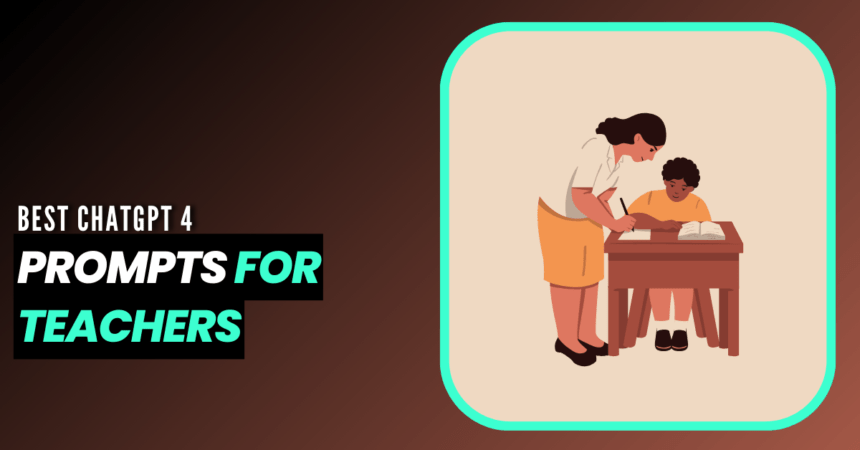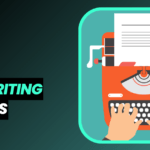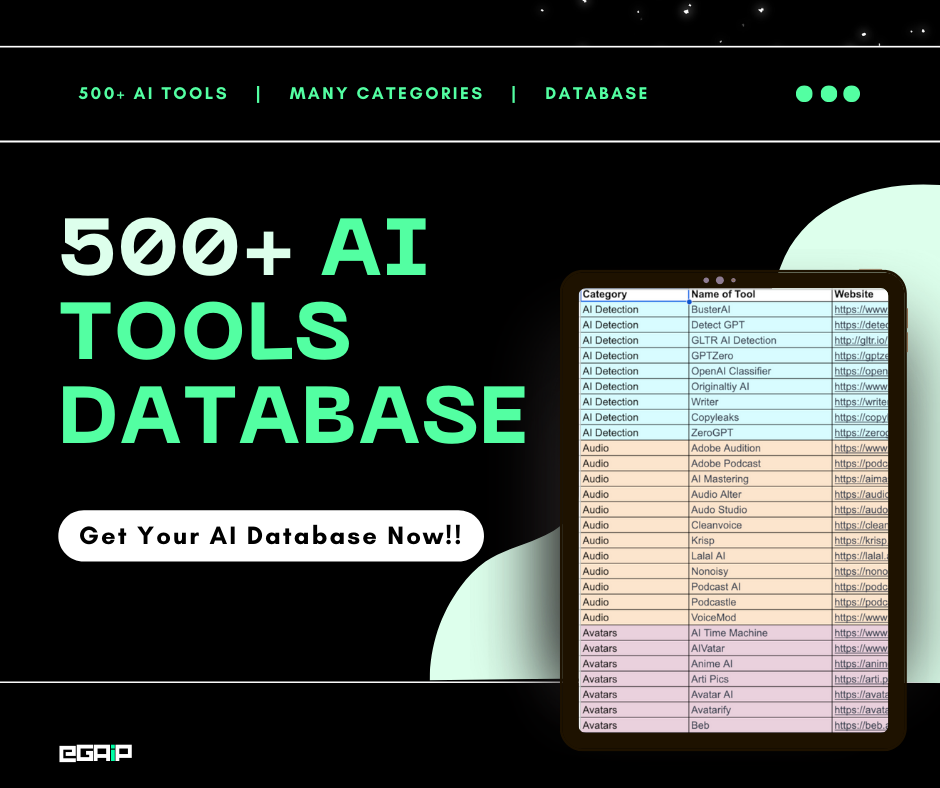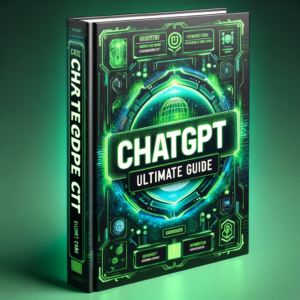Teaching is an ever-evolving profession; educators always seek innovative tools to enhance their students’ learning experience.
With the advent of artificial intelligence, one such tool has emerged: ChatGPT. In this article, we delve into various ChatGPT prompts that teachers can use to enrich their classrooms and provide valuable insights for their students.
Drawing on references from industry experts, we will discuss how to effectively harness this AI technology to benefit students and educators alike.
What is ChatGPT And How is it Helping Teachers Globally
OpenAI made ChatGPT, which is a cutting-edge model of language. It’s not just an algorithm; it’s also a dynamic interface that makes writing that looks like it was written by a person based on what you type into it.
The use of ChatGPT in school settings is groundbreaking because it makes learning more personal and exciting.
ChatGPT can engage students in deep, critical thought, enhance their problem-solving skills, and clarify complex concepts through interactive dialogue.
But the story doesn’t end there, here are some real-life success stories of teachers from around the globe who used ChatGPT to maximize their student’s teaching experience.
Stories of ChatGPT in Classroom Success:
- Interactive Role-Playing for Better Learning: Dr. Helen Crompton, a leading voice in Instructional Technology at Old Dominion University, utilizes ChatGPT as a dynamic role-playing tool. Whether acting as a debate partner to critique arguments or simulating job interview scenarios, ChatGPT provides students with a fresh, nuanced understanding of their coursework.
- Automated Curriculum Planning: Professor Fran Bellas at Universidade da Coruña empowers teachers to create engaging and inclusive lesson plans, quizzes, and exams using ChatGPT. By inputting the curriculum into the system, educators can request a myriad of creative and culturally relevant questions and lesson plans, tailored to the learning levels of their students.
- Bridging Language Gaps: Dr. Anthony Kaziboni, the Head of Research at the University of Johannesburg, emphasizes the language barrier as an academic hurdle. His solution? Using ChatGPT as a translation and conversational aid to enhance the English proficiency of non-native speakers, thus opening up greater educational and career opportunities for them.
- Cultivating Critical Thinking: Geetha Venugopal, a high school teacher in Chennai, India, compares teaching students about AI ethics to guiding them on internet usage. She reminds students to evaluate ChatGPT’s responses for credibility and accuracy and urges them to corroborate information through other trusted sources. The aim is to hone their inherent talents for critical thinking, problem-solving, and creative expression.
ChatGPT helps teachers in classrooms all over the world in many different ways, but it also makes the whole learning process better for students.
In case you’re looking for some awesome prompts for students too, check our list of ChatGPT prompts for students.
Best ChatGPT Prompts For Teachers
These prompts can stimulate thought, inspire creativity, and facilitate meaningful connections between students and educators.
Let’s have a look at some of the best ChatGPT prompts for teachers.
Note
Do not forget to use a System Prompt before you type any of the below prompts if you want to get better outputs as a teacher. For example, use this System Prompt as your first prompt: You are an AI who helps me assign homework to students, provide topic ideas for their exams, write emails to their parents, and so on.

Communication with Parents Prompts

- Write an email to parents explaining the benefits of parent-teacher conferences. [insert date and time]
- Draft a response to a parent who is concerned about their child’s recent drop in grades. [paste parent’s email]
- Compose a message to a parent requesting a meeting to discuss their child’s disruptive behavior. [insert student name]
- Provide a response to a parent who is questioning your homework policy. [paste parent’s email]
- Explain the importance of regular attendance to a parent whose child has been frequently absent. [insert student name]
Lesson Planning and Activities Prompts

- Generate a list of 5 engaging icebreaker activities for the first day of school.
- Design a 1-hour lesson plan on photosynthesis for 7th-grade students.
- Create a classroom activity to teach 5th-grade students about the American Revolution.
- Suggest 3 hands-on experiments for teaching 6th graders about electricity.
- Develop a 1-week unit plan for teaching high school students about the French Revolution.
Classroom Management Prompts
- Provide 5 strategies for maintaining a positive classroom environment.
- Outline 3 techniques for managing classroom noise levels.
- Suggest 5 ways to encourage student participation during class discussions.
- Offer 3 methods for dealing with students who consistently arrive late to class.
- Describe 5 techniques for preventing cheating during tests and exams.
Assessment and Feedback Prompts
- Create a rubric for assessing a 10th-grade research paper on World War II.
- Develop a checklist for evaluating group projects in a 9th-grade history class.
- Write feedback for a student who struggled with a persuasive essay assignment. [insert student name and essay excerpt]
- Suggest 3 ways to provide constructive criticism to students during a writing workshop.
- Design a self-assessment tool for students to evaluate their participation in a group project.
Professional Development Prompts
- Describe 5 professional development goals for a new teacher.
- Suggest 3 resources for learning more about teaching strategies for diverse learners.
- List 5 conferences or workshops for educators focused on integrating technology in the classroom.
- Write a reflection on a recent professional development experience and its impact on your teaching.
- Outline a plan for collaborating with colleagues to improve your school’s curriculum.
Communication with Parents Prompts

- Write an email to parents introducing a new school-wide positive behavior support program.
- Draft a response to a parent inquiring about resources for their child with learning difficulties. [insert student name]
- Compose a message to parents about upcoming standardized testing and how to help their child prepare.
- Offer an explanation to a parent concerned about their child’s social challenges at school. [insert student name]
- Write an email to parents about an upcoming school event or fundraiser.
Lesson Planning and Activities Prompts
- Design a 1-hour lesson plan on algebraic expressions for 8th-grade students.
- Create a classroom activity to teach 4th-grade students about the solar system.
- Suggest 3 collaborative projects for high school students studying environmental science.
- Develop a lesson plan for teaching Shakespeare’s “Romeo and Juliet” to 10th-grade students.
- Outline a 2-week unit plan for teaching middle school students about the Civil Rights Movement.
Classroom Management Prompts
- Provide 5 strategies for fostering a growth mindset in your students.
- Outline 3 techniques for effectively using classroom technology without causing distractions.
- Suggest 5 ways to create a more inclusive classroom environment.
- Offer 3 methods for helping students cope with test anxiety.
- Describe 5 techniques for promoting student self-regulation and time management skills.
Assessment and Feedback Prompts
- Create a rubric for assessing oral presentations in a high school English class.
- Develop a set of guidelines for peer assessment in a middle school science class.
- Write feedback for a student who excelled in a creative writing assignment. [insert student name and writing excerpt]
- Suggest 3 ways to use formative assessments effectively in your classroom.
- Design a portfolio assessment tool for evaluating student growth in a visual arts class.
Professional Development Prompts

- Describe 5 strategies for balancing work and personal life as a teacher.
- Suggest 3 resources for learning more about incorporating social-emotional learning into your classroom.
- List 5 professional organizations for educators in your subject area.
- Write a reflection on a recent collaboration with a colleague and its impact on your teaching.
- Outline a plan for seeking and incorporating student feedback to improve your teaching practice.
Curriculum and Instruction Prompts
- Suggest 5 ways to differentiate instruction for students with diverse learning needs.
- Develop a lesson plan for integrating art into a social studies unit for 5th-grade students.
- Write a rationale for teaching critical thinking skills in a high school English class.
- Describe 3 strategies for teaching students how to effectively conduct research.
- Outline a plan for incorporating multicultural education in your classroom.
Teacher-Student Relationships Prompts
- Provide 5 strategies for building rapport with your students.
- Suggest 3 ways to help students feel valued and supported in your classroom.
- Describe 5 techniques for encouraging open communication between teachers and students.
- Offer 3 methods for helping students set and achieve personal goals.
- Write a reflection on the importance of empathy and understanding in fostering strong teacher-student relationships.
Bonus Teacher Prompts for ChatGPT

- Design a project-based learning assignment for a 6th-grade geography class.
- Suggest 3 ways to incorporate popular culture into your lessons to engage students.
- Write a letter to your future self reflecting on your current teaching practices and goals.
- Create a list of 5 engaging activities for teaching figurative language to middle school students.
- Develop a plan for integrating mindfulness and stress-reduction techniques into your classroom routine.
- Suggest 5 ways to use technology to enhance student learning and collaboration.
- Describe 3 strategies for helping students develop problem-solving skills.
- Write a proposal for a school-wide initiative to promote environmental sustainability.
- Develop a lesson plan for teaching digital citizenship and online safety to elementary school students.
- Create a list of 5 engaging activities for teaching measurement and data to 2nd-grade students.
Bonus: ChatGPT Prompts That Are Actually Awesome
Inspired by the work of Ethan Mollick and Lilach Mollick at Wharton Interactive, OpenAI made some example questions for teachers on how to use ChatGPT in the classroom.
These questions cover a wide range of uses, such as making lesson plans, writing clear descriptions, letting students teach, and getting help from AI.
Here are some important things to know before you start:
Note
- The model’s answers are not always correct. You’re the expert in the material, so use these prompts as a starting point.
- Evaluate the appropriateness of these prompts for your specific classroom.
- Feel free to adapt and modify these prompts as you see fit.
Craft Engaging Lesson Plans with AI Instructional Coach
- “Hi, I’m your friendly AI instructional coach! What topic do you plan to teach, and what is the grade level of your students?”
- “Do your students already have some background knowledge on the topic, or is this entirely new to them?”
- “What learning goals do you have for this lesson? What do you want your students to achieve?”
After collecting this information, the model can provide a tailored lesson plan encompassing various teaching strategies.
Simplify Complex Ideas with AI Instructional Designer
- “Hello, I’m here to assist you in crafting clear and effective explanations. What grade level are your students?”
- “What concept are you trying to explain?”
- “How does this concept fit into your existing curriculum? What do your students already know about it?”
The model then offers a concise explanation, examples, and an analogy for the concept.
Student-Led Teaching for Enhanced Understanding
- “Hi there! I’m a student who has studied the topic you’re interested in. What would you like me to explain?”
- “How would you like me to apply this topic? Through a poem, a scene from a TV show, or maybe a short story?”
After the teacher responds, the model will provide a one-paragraph explanation and two applications of the topic, followed by an evaluation request.
Meet Your AI Tutor for Personalized Learning
- “Hi, I’m your AI tutor. What would you like to learn about today?”
- “Are you a high school student, a college student, or a professional?”
- “What do you already know about the topic you’ve chosen?”
The AI will then guide the student through the learning process, adapting its approach based on their level and prior knowledge.
These prompts aim to be dynamic and user-centric but always feel free to iterate and adapt them according to your needs and those of your students.
Note
Refer to this external article for more information on ChatGPT Prompts for teachers: A Teacher’s Prompt Guide to ChatGPT.
Frequently Asked Questions by Educators/Teachers
Is ChatGPT Suitable for All Grade Levels and Subjects?
ChatGPT is adaptable and can be tailored to suit various grade levels and subjects. Teachers can customize the prompts to align with their curriculum and the specific learning needs of their students.
What Is the Purpose of Using ChatGPT Prompts in The Classroom?
The primary purpose of using ChatGPT prompts in the classroom is to enhance student engagement, stimulate critical thinking, and facilitate a deeper understanding of complex concepts. ChatGPT can also help teachers create more interactive and dynamic lesson plans while supporting their professional development.
How Can I Ensure that The Content Generated by ChatGPT Is Appropriate for My Students?
Although ChatGPT is designed to generate human-like text, it is still an AI model and may occasionally produce content unsuitable for your classroom. Always review and edit the generated content to ensure appropriateness before sharing it with your students.
How Can Schools Address AI-Generated Content?
Schools are progressively incorporating AI use policies. We suggest educators research existing policies to adopt what’s best for their respective institutions.
Do AI Detectors Work?
No, current AI detectors are not fully reliable. However, teachers can still track students’ interactions with ChatGPT for assessment purposes, focusing on their critical thinking skills and understanding of AI limitations.
How Can Educators Begin Using ChatGPT?
OpenAI, in collaboration with Wharton Interactive, offers prompts to help teachers integrate ChatGPT into their teaching methods. These prompts can assist in lesson planning, developing explanations, and even creating AI-based assignments.
Can I Ask ChatGPT if it Wrote Something?
No, ChatGPT cannot verify authorship of content as it has no memory or awareness of its previous outputs.
Look at more awesome resources that we have created just for you:











Wow! I checked out this resource and sent it to some college staff members in my department. “A Teacher’s Prompt Guide to ChatGPT.” So well written. Thanks for the suggestion.
Thank you so much Sheryl.
Interesante la propuesta y bien por su análisis al favorecer a la comunidad académica docente, quienes debemos aborde el tema, desde una postura pedagógica de manera crítica, en pro del uso de un programa en línea aplicado de manera sincrónica y asincrónica, es el caso del CHAT-GPT, un recurso por explorar en los diferentes niveles en las facultades de educación presencial y virtual en las instituciones formadoras de docentes e investigadores, cuál es potencial del recurso, sus oportunidades, alcances, fortalezas, debilidades en función de intercambiar de manera transversal el conocimiento teórico y práctico desarrollado por el hombre en diferentes épocas: tanto del pasado, presente y posible futuro, a su vez, lograr conectar y desconectar las diferentes disciplinas de la ciencia en un proceso continuo, constante de su desarrollo, para generar novedad en el proceso formativo de cada docente en cada facultad e institución.